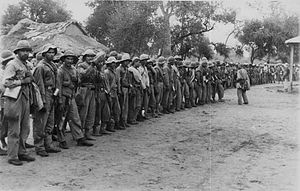Chaco war
| Chaco War | |||||||||
|---|---|---|---|---|---|---|---|---|---|
| Part of the Interwar period | |||||||||
 Paraguayan soldiers photographed in 1932 |
|||||||||
|
|||||||||
| Belligerents | |||||||||
|
|
Supported by: |
||||||||
| Commanders and leaders | |||||||||
| Strength | |||||||||
|
210,000 Foreign volunteers:
|
150,000 Foreign volunteers:
|
||||||||
| Casualties and losses | |||||||||
| 50,000–80,000 killed | 35,000–50,000 killed | ||||||||
210,000
150,000
The Chaco War (1932–1935; Spanish: Guerra del Chaco, Guarani: Cháko Ñorairõ) was fought between Bolivia and Paraguay over control of the northern part of the Gran Chaco region (known in Spanish as Chaco Boreal) of South America, which was thought to be rich in oil. It is also referred to as La Guerra de la Sed (Spanish for "The War of Thirst") in literary circles, for being fought in the semi-arid Chaco. It was the bloodiest military conflict fought in South America during the 20th century, between two of its poorest countries, both having previously lost territory to neighbors in 19th-century wars.
During the war, both landlocked countries faced difficulties shipping arms and supplies through neighboring countries. Bolivia faced particular external trade problems, coupled with poor internal communications. Although Bolivia had lucrative mining income and a larger, better-equipped army, a series of factors turned the tide against it, and Paraguay came to control most of the disputed zone by war's end.
The ultimate peace treaties granted two-thirds of the disputed territories to Paraguay.
The origin of the war is commonly attributed in Latin America to a conflict between the oil companies Royal Dutch Shell backing Paraguay and Standard Oil supporting Bolivia. The discovery of oil in the Andean foothills sparked speculation that the Chaco might prove a rich source of petroleum, and foreign oil companies were involved in the exploration. Standard Oil was already producing oil from wells in the high hills of eastern Bolivia, around Villa Montes. However, it is uncertain if the war would have been caused solely by the interests of these companies, and not by aims of Argentina to import oil from the Chaco. In opposition to the "dependency theory" of the war's origins, the British historian Matthew Hughes argued against the thesis that Bolivian and Paraguayan governments were the "puppets" of Standard Oil and Royal Dutch Shell respectively, writing: "In fact, there is little hard evidence available in the company and government archives to support the theory that oil companies had anything to do with causing the war or helping one side or the other during the war".
...
Wikipedia
